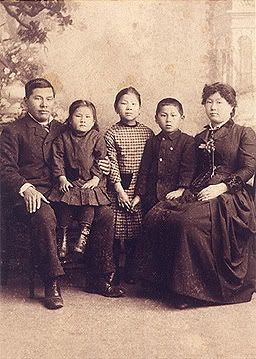 |
| Tape Family |
In 1885, the Tape v. Hurley court case set a landmark in the San Francisco area. The San Francisco Unified School District’s conflict over racial inequality during the 1880s uncovered historical struggles for the Asian Americans. In September 1884, Mamie Tape, an 8-year-old Chinese American who was born in San Francisco, was denied admission to the all-white public school (Spring Valley School) in San Francisco due to her Chinese ancestry. Miss Hurley, the principal of one of the public schools in S.F., refused to admit Mamie Tape and argued the school board policy must protect the Caucasian children from mixing with the Chinese. Mamie’s parents, Joseph Tape and Mary McGladery, (first generation Chinese Americans) sued the school principal and A.J Moulder, a member of the San Francisco Board of Education, in 1885. The Tapes used the California Political Code to argue their case. The code stated that “Every school, unless otherwise provided by law, must be open for the admission of all children between six and twenty-one years of age residing in the district; and the board of trustees, or city board of education, have power to admit adults and children not residing in the district, whenever good reason exist therefore. Trustees shall have the power to exclude children of filthy or vicious habits, or children suffering from contagious or infectious diseases." (Political Code, § 1667.) The School Boards defended their position by stating the policy under the California constitution, which said that the Chinese are “dangerous to the well-being of the state,” so the school did not need to educate the Chinese students due to their dangerous quality.
The decision was made on January 9, 1885 when the Superior Court Justice McGuire sided with the Tapes family. The California Supreme Court case stated: “Children between six and twenty-one years of age, of Chinese parentage, who were born and have always lived in the city and county of San Francisco, are entitled to admission into the public school of the district in which they reside. And teachers are not justified in excluding them, notwithstanding a resolution of the Board of Education purports to command them so to do.” Although the decision was in favor of the Tapes family, the San Francisco Board of Education created a separate school system for the Chinese and other children of Asian descent to attend. Thus they created the Oriental Public School in San Francisco.
Posted by Mary Hungju Chen
For More Information
The decision was made on January 9, 1885 when the Superior Court Justice McGuire sided with the Tapes family. The California Supreme Court case stated: “Children between six and twenty-one years of age, of Chinese parentage, who were born and have always lived in the city and county of San Francisco, are entitled to admission into the public school of the district in which they reside. And teachers are not justified in excluding them, notwithstanding a resolution of the Board of Education purports to command them so to do.” Although the decision was in favor of the Tapes family, the San Francisco Board of Education created a separate school system for the Chinese and other children of Asian descent to attend. Thus they created the Oriental Public School in San Francisco.
Posted by Mary Hungju Chen
For More Information

No comments:
Post a Comment